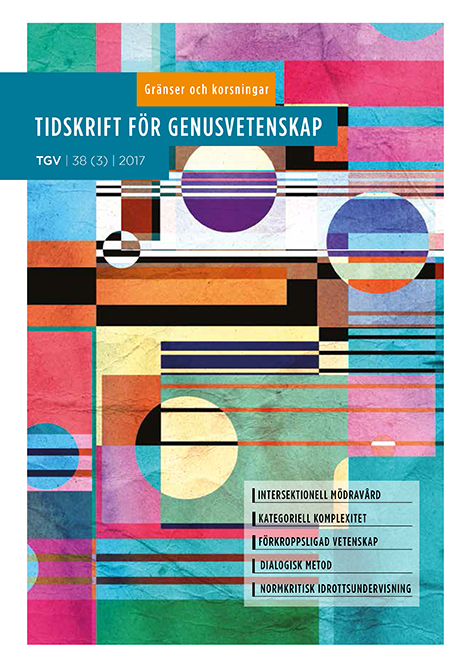"Invandrarkvinna", "svensk" och "jämställd"
Om kategoriell komplexitet och (o)synliggörande i utbildning, politik och arbete
DOI:
https://doi.org/10.55870/tgv.v38i3.2914Nyckelord:
kategoriell komplexitet, ”invandrarkvinnor”, ”svenskhet”, jämställdhet, SFI (Svenska för invandrare), syn på lärande, ”arbetslinjen”, diskursanalysAbstract
This article examines categorical complexity in terms of “immigrant woman”, ”Swedishness” and “gender equality” in relation to education, politics and work. The specific Swedish approach to gender equality has become an important marker, a national self-image and a certain “success story”, where binary classifications function as demarcations between “Swedes” and “the Other”. This article discusses distinctions, positionings and categorisations, which are repeatedly expressed in relation to education and work, not least in terms of the language course “Swedish for immigrants” (SFI) and its social orientation. The empirical data consists of policy and steering documents, textbooks, interviews and debates in various contexts such as in media and in Parliament. The main theoretical framework is critical discourse analysis. A deconstruction of ideas and identifying discourses related to the category “immigrant woman” is conducted together with a focus on the concept of “immigrant” – a category that tends to be unisexual. The analysis shows how gendered, culturalized and ethnified discourses are discerned throughout the history of SFI, from the 1960s to the present, and how the constructions of the immigrant and the Swede are played out together with fostering attitudes. In particular, an ethnocentric and ideological gender equality discourse is linked to Swedish norms. Perceptions of the traditional and culturally bound immigrant woman are strongly emphasised in dominant discourses and an object that always is about to be changed, which the course participants sometimes show resistance to. The immigrant woman is also invisible in relation to work; she does not fit the constructed ”immigrant worker”, which consists of men, even though the majority of immigrant women are also working.
Nedladdningar
Downloads
Publicerad
Referera så här
Nummer
Sektion
Licens
Författaren/författarna behåller copyright till verket.





